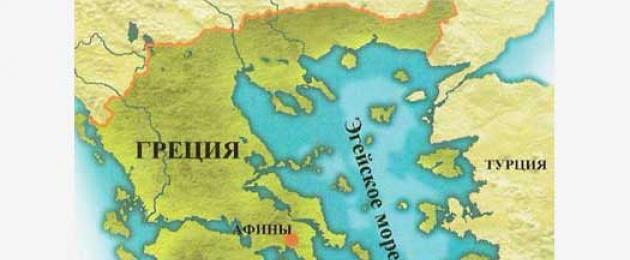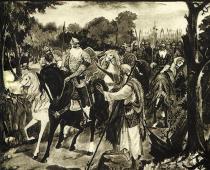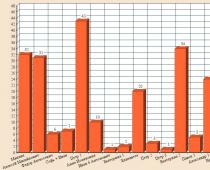It is difficult to speak briefly about Ancient Greece. After all, this country had a huge impact on the formation of not only Western culture, but the entire world civilization. The ideas of Europeans about politics, philosophy, architecture, literature, medicine, astronomy, and art are based on the ideas of the ancient Greeks.
It is impossible, for example, to consider a person educated if he does not know the basics of Greek mythology. In any art gallery, without this knowledge, it is generally impossible to understand what is depicted on most canvases. European languages contain a large percentage of Greek definitions and words. And in Russian, Cyrillic is based on Greek writing.
It is surprising that such a huge role in the history of human civilization was played by a small people inhabiting a small area. People lived in city-states located in the southernmost part of the Balkan Peninsula.
Even in their heyday, the total population of inhabitants did not exceed one million people. This was much less than in Egypt, Persia, Babylonia, and also other great ancient monarchies. But we all know that often the point is not at all in quantity, but in quality. Alexander the Great said that one Hellenic (ancient Greek) can be equated to a hundred barbarians.
The inhabitants of the Balkan Peninsula called barbarians the peoples living in the neighborhood. This definition extended to the Eastern powers as well. The Greeks themselves considered themselves the flagships of human civilization. It should be noted that this opinion is largely correct.
Natural features of Greece
Nature divided the Balkan Peninsula into three parts. These are northern, middle and southern. Northern part begins south of Macedonia. In ancient times, it included the states located in the north of the peninsula. Currently, the historical regions of Epirus and Thessaly are located here.
middle part Greece is separated from the north by high mountains. Communication is carried out through the Thermopylae passage along the coast of the Aegean Sea. In ancient times, such areas as Boeotia, Aetolia, Phocis, as well as the most developed and richest of them, Attica, were located here. Its main center was the city of Athens.

southern part represents the Peloponnese peninsula. It is separated from the middle regions by the Isthmus of Corinth. Here the main area was considered Lakonika. It is better known to modern people by the name of the militarily strong city of Sparta.
Near the Balkan Peninsula there are many islands located in the Aegean Sea. The largest of them are Crete, Rhodes, Euboea, Chios, Lesvos. Ancient people also inhabited the eastern coast of the Aegean. In these places such areas as Kariya, Ionia, Aeolis were located.
Everyone understands that mountainous terrain limits areas suitable for agriculture. It requires great skill to work the land. Therefore, it was difficult with arable land and crops in these places. But the indented and difficult to pass coastline has led to the rapid development of navigation.
ancient era
In ancient times, the lands of Ancient Greece were inhabited by people who were called Pelasgians. Their skin was light and their hair dark. In the III millennium BC. e. they owned writing, lived in fortified settlements, engaged in various crafts and agriculture.
At the end of this millennium, invaders from the north of the Balkan Peninsula invaded the fertile lands. Historians call them proto-Greeks, but they are better known as Achaeans. As a result of the aggression, the indigenous population was either destroyed or forced out of their lawful lands. Those who survived and managed to adapt to the new situation mixed with the invaders.

Mycenae city
The Achaeans created large city-states. The largest and most powerful of them was the city of Mycenae. The emergence of the city of Troy also belongs to the same period. It was inhabited by the Tevkrov tribe. Homer in the 8th century BC e. wrote a poem about the campaign of the Achaeans against the Trojans.
For a long time, historians considered the Trojan War a fiction. But the archaeologist G. Schliemann in the 19th century discovered the ruins of the ancient city and put forward the idea that it was destroyed by a strong fire. The fire devouring everything could have arisen as a result of the siege and assault on Troy by the Achaean troops.
Minoan civilization
Speaking briefly about Ancient Greece, the island of Crete should also be mentioned. It was a prosperous area in 2000-1400 BC. e. This period is referred to as the Minoan civilization or the Minoan culture.
The name comes from a luxurious palace in the city of Knossos. In it, according to ancient legend, King Minos lived. The entire island was under his rule. It was on the orders of Minos that a huge fleet was built. With his help, the formidable lord subjugated the neighboring islands. It is believed that even proud Athens paid tribute to the all-powerful ruler.
![]()
ancient greek utensils
However, as King Solomon said, everything passes. At the end of the 15th century BC. e. There was a natural disaster in Crete. As a result, the Minoan civilization perished. Experts believe that the whole reason was the volcanic eruption on the island of Fera. The eruption caused a tsunami. A huge wave destroyed the Cretan cities along with the inhabitants. After that, the Achaeans occupied the island of Crete and settled on it.
There is every reason to believe that it was a natural cataclysm in Crete that became the source of the legend of Atlantis. People altered the historical truth and came up with a mighty power that existed on a huge continent in the Atlantic Ocean.
archaic era
The Achaeans, who settled in the Balkans, lived quietly and prosperously until the end of the 13th century. It was at this time that the peoples of the sea appeared on the fertile and well-fed lands of Ancient Greece. Almost nothing is known about them. Only ancient Egyptian sources describe them as slender white-faced people with dark and blond hair.
These warlike tribes destroyed most of the Achaean cities. Their population was slaughtered. Only those who managed to go to the mountains and settled in hard-to-reach places were saved.
It is assumed that the liberated lands were settled by the Dorians. This people stood at a much lower stage of development. Therefore, the culture has declined. The construction of stone buildings ceased, and the tools of labor became primitive and crude. The old script was forgotten, but the new one was not created. The period of general decline fell on the XII-IX centuries BC. e. Historians call it the "dark ages".
In the Balkans, people lived in small villages ruled by local kings. The backbone of society was made up of patriarchal families that had their own households. At that time there were very few slaves. Only temples, shrines and rulers owned them.
But then came the 8th century BC. e. It is characterized by a rapid rise in all spheres of life. In just 200 years, there have been dramatic changes in ancient Greek society. What caused the rapid evolution is not clear. But on the site of squalid villages, prosperous city-states appeared.
Trade and money circulation began to develop rapidly. A new script emerged, based on the Phoenician alphabet. The construction of temples, theaters, stadiums, and public buildings began. Greek ships began to plow the waters of the entire Mediterranean Sea. Settlement colonies appeared in Asia Minor, southern Italy, Sicily, on the shores of the Black Sea.

Writing utensils and papyrus sheet in Ancient Greece
City-states or more correctly policies (polis in Greek means city) were headed by kings. They formed an aristocracy. Below was a large stratum of the common population, and at the very bottom of the social ladder were slaves. At the same time, their numbers increased rapidly.
Thus, speaking briefly about Ancient Greece, we can conclude that in the VIII century BC. e. an entirely new state was formed. It took as a basis the culture that was inherent in the Achaeans. Based on these basic values, an even more progressive culture was created. In addition, a new written language arose, science and philosophy began to develop rapidly. The period of the ancient world began, about which modern people know quite a lot.
- In contact with 0
- Google+ 0
- OK 0
- Facebook 0








